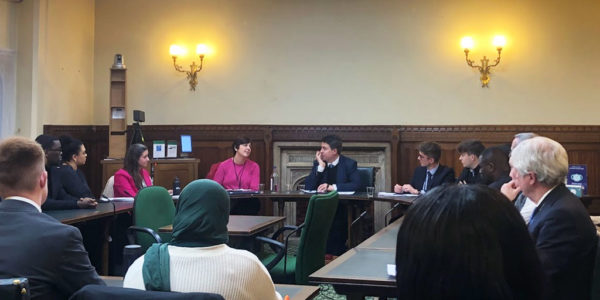On the 29th of November, the APPG for Youth Employment held its second meeting of its inquiry exploring the impact of mental ill health on young people accessing the labour market and good quality work. The session was held in the House of Commons and was chaired by Shaun Bailey MP.
The session heard key evidence from two expert speakers on youth employment and mental health and heard testimony from two young people sharing their own experience of mental ill health and the impacts this has had on them and their journey into work.
Evidence from Martina Kane – The Health Foundation
In the session, the inquiry heard from Martina Kane, Policy and Engagement Officer for The Health Foundation, who gave expert insight on the current NHS mental health services and provision for young people and the relationship between work and health. Martina told the inquiry that the trend of young people’s mental health has been one of growing concern and one that has seen increases across all measures. This can be seen in survey data, GP prescribing data, the number of referrals for mental health services, and the use of mental health crisis services. Martina also shared findings from a new longitudinal COSMO Survey, The Covid Social Mobility and Opportunities Study, published last week, which found that 44% of 16-17-year-olds reported elevated psychological distress compared to 35% in 2017 and 23% in 2007. This shows that rising mental health issues predate the pandemic but have been exacerbated by the periods of lockdown, with Quality Watch analysis highlighting a huge surge in demand for children and young people’s mental health services – with an 81% increase in referrals in April to September 2021, compared to the same period in 2019.
Martina told the inquiry that whilst NHS services have been expanding to respond to this challenge it has not been expanding rapidly enough to meet the demands of this challenge, leaving a gap in provision. Consequently, mental health services are prioritising those in most severe need with high levels of gate-keeping for secondary services such as CAMHS. In addition, research funded by the Health Foundation has found that the monthly number of mental health prescriptions for under 25s has been growing enormously.
Martina emphasised to the inquiry that the NHS is not designed to tackle this challenge on its own, “causes of mental health problems in young people are complex, but surrounding context is often overlooked in a medical model that emphasises diagnosis and cure. We’re seeing a stretched NHS managing to pick up the pieces for a large number of young people in crisis. If we want to pick up more pieces we need to fund the NHS – which is really important. But, if we want to make sure that fewer young people end up in crisis is the responsibility of wider society. ”
Martina also shared insights on the link between health and employment. Martina told the inquiry that there is a reinforcing relationship between work and health. Good quality work offers several things which are good for health, including the potential for a good income, financial stability, security, and a sense of purpose. Conversely, unemployment has a detrimental impact on health and mental health. Unemployment is a source of stress, particularly stress of losing the structure of work, and the difficulties of seeking new work. Unemployment can cause poverty, which itself damages health. In addition, unemployment can harm future employment outcomes, leaving people with a lower earning potential and, therefore, lower future resources.
Martina also told the inquiry that we are at a critical juncture to support young people. In the context of the pandemic and now as we move into an economic recession young people must be supported in their first steps into work. Citing analysis from the Resolution Foundation, Martina told the inquiry that young people who experienced mental health problems after the financial crisis in 2008 were more likely to be out of work 5 years later than those who hadn’t experienced problems. As such, it is important that action to help young people with mental ill health and poor well-being into the labour market and access good quality work happens quickly.
Charlotte Jeffreys – Prince’s Trust
The session also heard evidence on behalf of Charlotte Jeffreys, Policy and Research Executive at The Prince’s Trust who shared the key findings from the Prince’s Trust Annual 2022 Youth Index and a recent research report by The Prince’s Trust and Learning and Work Institute which explores the characteristics of and challenges faced by young people who are NEET.
Charlotte Jeffreys told the inquiry that there is a strong correlation between not being in employment, full-time education, or training and mental health:
- The Prince’s Trust Annual 2022 Youth Index found that almost half of all young people who are NEET said being unemployed made them feel helpless.
- Among young people who are NEET, 1 in 4 report they feel constantly anxious.
- 38% NEET of young people say struggling to find work makes them feel lonely
- In addition, The Prince’s Trust Class of Covid report found 49% of young people feel anxious about the future on a daily basis.
Charlotte also told the inquiry that young people with mental health conditions who want to work must be supported into employment, referencing a recent report from the Prince’s Trust and Learning and Work Institute “The Power of Potential”, the inquiry was told that there are half a million young people who are ready to work, with the right support.
- Analysis of ONS data finds that the main health condition of 16-24-year-olds who are economically inactive due to illness/disability is depression, anxiety, and mental illness
- When asked what caused difficulty finding a job, 38.5% cited mental health/disability.
- 22.5% said they do not have the confidence for work
- 30% inactive due to sickness/disability say they want to work
- During a time of high vacancies and high economic uncertainty, there is a missed opportunity to support these young people to fill gaps in the labour market
- Young people wanted help with building confidence, accessing work experience, and support with mental health and disabilities.
Charlotte summarised her contribution by telling the inquiry that whilst mental ill health may be a barrier to employment for some young people it is not an insurmountable one. When considering recommendations, Charlotte told the inquiry that there will be no one size fits all approach, however, she did lay out a number of steps to be considered:
- Supporting young people with mental health conditions into work is an important part of addressing the youth mental health crisis.
- Collaboration between the third sector, employers, educators, health practitioners, and the government is essential to address barriers from all angles.
- It is also clear that mentoring and confidence building is important to young people. Whilst this has been very focused on mental health, a well-being focus for all young people is crucial as improved well-being is preventative for the development of mental illness. Mentoring could play an important role as part of a wider well-being approach.
- Supporting young people with mental health conditions into work is beneficial for all. It helps young people to lead a fulfilling life while creating a more diverse workforce full of new ideas.
- When looking at a labour market with growth markets and challenging skills gaps, our research indicates that young people could have a significant role to play in meeting these needs, provided they receive the support they need.
Youth Voice
The inquiry also heard input from two Youth Ambassadors at Youth Employment UK and Eilish Peters, Policy and Youth Voice Coordinator for Youth Employment UK. Eilish shared her insights from talking and listening to young people about their concerns regarding mental health and good quality work. Eilish told the inquiry that young people are still struggling with the impact of COVID-19, remote working, and the absence of social interaction all impacting young people’s confidence when meeting new people and integrating with the workplace. Eilish also informed the inquiry that young people are not feeling supported at key transition points in their lives such as moving to university and moving into full-time employment for the first time, leaving many feeling anxious and alone as they navigate the next phase of their lives. Young people are also unsure of how to access support for their mental health, both within the workplace and also when out of work, adding to a sense of helplessness and uncertainty. Eilish concluded by saying, “This demonstrates the need for more open dialogue around mental health in the workplace….we need to make sure it’s clear that the systems surrounding young people make them feel supported but also that when they do need additional support they know where to go to and who to turn to.”
The inquiry then heard evidence from Euan, a Level 6 Apprentice, and Youth Employment UK Youth Ambassador. Euan shared with the inquiry the lack of support he received from his school when choosing his next steps after Sixth Form, Euan felt pressured to apply to university and did not feel supported in following his preferred choice of applying for an apprenticeship scheme. Euan told the inquiry that this lack of support from his school left him feeling alone and made his transition from full-time education to employment more difficult than he felt it should have been. Euan shared with the inquiry the importance of a positive, supportive culture around mental health in the workplace. Euan told the inquiry that his job is often high-pressured and stressful, however, his employer provides free counseling sessions and this is something that he has benefitted from. Euan recognised that this level of support was not available for all young people in the workplace and urged employers to do more to ensure that their young staff has access to the support they need.
Finally, the inquiry heard from Gloria, a Youth Employment UK Youth Ambassador, who shared her own experiences of mental health challenges whilst in the workplace. Gloria told the inquiry that her initial experiences of full-time work had been challenging as she had struggled to adapt to the pressures of the corporate world. Gloria told the inquiry that she felt unprepared when entering the workplace and would have liked to have received more help and support before entering employment which would have helped her adjust to the pressures of the working world. Gloria also emphasised that young people must have greater access to work experience to ensure that young people have exposure to the routines, expectations, and pressures of employment to ensure they feel prepared for full-time work when they have completed their education.
The Chair opened for questions and explored a number of paths with the inquiry. Closing by thanking the great speakers and contributors.
Summary
This meeting was the final meeting hearing evidence for the inquiry. The inquiry will now move into its second phase as it receives written submissions and prepares its final report, which will be presented in Parliament at the end of January.
If you would like to contribute to the inquiry you can find further details on the inquiry questions and guidance for submissions here. The deadline for written submissions is Friday 9th December.












